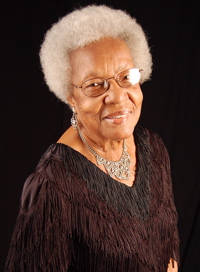Why We’re Honoring Gertrude Jackson
This guest post was written by Dr. John A. Kirk, George W. Donaghey Professor and Chair of History.
Gertrude Jackson once had a gunshot fired at her car. As a child, she walked nine miles to school each day. Jackson, who has lived in the Arkansas Delta for more than 80 years, has seen her share of struggle but it is her giving spirit and tenacity that make her so remarkable.
 As influential Arkansans go, Jackson should be near the top. Her work toward community organizing, activism, and betterment in the Delta has resulted in the desegregation of a school district and the creation of a community center in the Marvell area.
As influential Arkansans go, Jackson should be near the top. Her work toward community organizing, activism, and betterment in the Delta has resulted in the desegregation of a school district and the creation of a community center in the Marvell area.
On Dec. 20, at its fall commencement ceremony, UALR will award Jackson an honorary doctorate.
Jackson, now 89, was born in Madison, Ill. At age 7 she moved with her family to Gum Bottom, an area near the Turner community in Phillips County. Her grandfather’s death had prompted her father to return to the small family farm to assist her grandmother.
Jackson walked nine miles each day to attend a one-room segregated school through to the eighth grade. After that, she attended the all-black Marvell High School, which only went up to the 10th grade.
In 1944, she married Earlis Jackson. The couple ran a small farm near to her family’s homestead. In the 1960s, when the civil rights organization the Student Nonviolent Coordinating Committee (SNCC) started organizing in the area, Gertrude and Earlis became one of their main community contacts. SNCC meetings provided a place to discuss and act upon black community grievances.
One of the first issues the Jacksons and SNCC tackled was the back up of sewage at the black Turner Elementary School every time it rained because of poorly installed drainage pipes. A boycott of the school organized by SNCC and the Jacksons led to the problem being fixed.
Emboldened by the success of the collective action, they began to discuss school desegregation. In the summer and fall of 1966 a successful six-week school boycott by African American families of the entire Marvell School District took place. The boycott, together with a class action suit, led to the United States Court of Appeals Eighth Circuit ordering the school district “to fully and effectively desegregate not only all facilities but the faculty and classes effective at the beginning of the 1970-71 school year.”
The Jacksons faced retributions because of their community leadership. One day, a gunshot was fired at Gertrude Jackson’s car. On another occasion, sugar was put in the gas tank of the Jacksons’ cotton picker. Another time, Earlis Jackson averted an arson attempt by removing his burning truck from the shed where all the farm vehicles were kept.
Nevertheless, the Jacksons did not give up their struggle for freedom and equality. In 1978, Gertrude Jackson helped establish a community center, named the Boys, Girls, Adults Community Development Center (BGACDC), with a mission of helping meet the needs and developing the full potential of all poor children of every race and their families.
In addition to meeting the social, educational, and recreational needs of the children of the community, the BGACDC has expanded to help meet the need for accessible and affordable health care, affordable decent housing, and the social and recreational needs of low to moderate income adult residents of the community. It is still considered the center of community life in the Marvell area.
And still today, approaching her nineties, Gertrude Jackson remains an important and tireless advocate for bettering the lives of those in the Arkansas Delta, black and white.